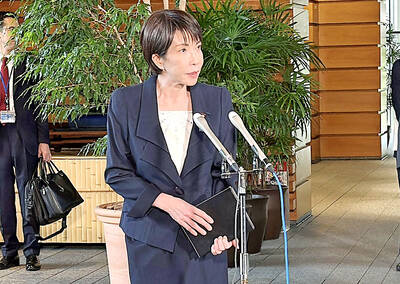Mexican President Felipe Calderon on Wednesday hit back at accusations his government was failing in the fight against violent drug cartels, saying that corruption in the US was also to blame.
With murders among feuding Mexican drug cartels on the rise and continued ravenous demand for cocaine and other illegal drugs north of the border, Calderon said the US should take a hard look at itself before pointing the finger at anyone else.
“The main cause of the problems associated with organized crime is having the world’s biggest consumer next to us,” Calderon said in an interview.
“Drug trafficking in the United States is fueled by the phenomenon of corruption on the part of the American authorities,” he said, calling on US President Barack Obama to step up the fight against drugs in his own country.
Calderon admitted some Mexican officials had helped cartels, but urged the US to consider how many of its officials have been implicated.
“I want to know how many American officials have been prosecuted for this,” he said, listing a string of prosecutions made against Mexican police officers and government officials during his administration.
“It is not an exclusively Mexican problem, it is a common problem between Mexico and the United States,” he said.
Although cocaine is largely produced in South America, Mexican cartels control much of the multi-billion-dollar trade, transporting the drug to consumers in the US.
Since taking office in late 2006, Calderon has launched a wide-ranging crackdown on drug cartels, often with bloody repercussions, as cartels hit back with ever-higher levels of violence and intimidation.
Some 5,300 people were murdered in drug violence across Mexico last year. Ciudad Juarez, across from El Paso, Texas, was worst hit, with more than 1,600 drug-related deaths reported.
Mexico’s ill-equipped police and security forces are often out-gunned by the well-armed gangs.
The administration of former US president George W. Bush pledged US$1.6 billion over three years in security assistance to Mexico and Central America, primarily aimed at better equipping Mexico’s security forces.
To even the playing field further, Calderon called on US officials to do more to stem the flow of weapons from the US to Mexico, a route often used by traffickers to acquire arms.
“The biggest empowerment of organized crime are the weapons that arrive from the United States,” the president said.
“Since 2006 we have decommissioned 27,000 arms, everything from missile launchers to 2,500 grenades. We have also found uniforms and arms belonging to the US Army,” Calderon said.

‘MOTHER’ OF THAILAND: In her glamorous heyday in the 1960s, former Thai queen Sirikit mingled with US presidents and superstars such as Elvis Presley The year-long funeral ceremony of former Thai queen Sirikit started yesterday, with grieving royalists set to salute the procession bringing her body to lie in state at Bangkok’s Grand Palace. Members of the royal family are venerated in Thailand, treated by many as semi-divine figures, and lavished with glowing media coverage and gold-adorned portraits hanging in public spaces and private homes nationwide. Sirikit, the mother of Thai King Vajiralongkorn and widow of the nation’s longest-reigning monarch, died late on Friday at the age of 93. Black-and-white tributes to the royal matriarch are being beamed onto towering digital advertizing billboards, on

Indonesia was to sign an agreement to repatriate two British nationals, including a grandmother languishing on death row for drug-related crimes, an Indonesian government source said yesterday. “The practical arrangement will be signed today. The transfer will be done immediately after the technical side of the transfer is agreed,” the source said, identifying Lindsay Sandiford and 35-year-old Shahab Shahabadi as the people being transferred. Sandiford, a grandmother, was sentenced to death on the island of Bali in 2013 after she was convicted of trafficking drugs. Customs officers found cocaine worth an estimated US$2.14 million hidden in a false bottom in Sandiford’s suitcase when

POWER ABUSE WORRY: Some people warned that the broad language of the treaty could lead to overreach by authorities and enable the repression of government critics Countries signed their first UN treaty targeting cybercrime in Hanoi yesterday, despite opposition from an unlikely band of tech companies and rights groups warning of expanded state surveillance. The new global legal framework aims to bolster international cooperation to fight digital crimes, from child pornography to transnational cyberscams and money laundering. More than 60 countries signed the declaration, which means it would go into force once ratified by those states. UN Secretary-General Antonio Guterres described the signing as an “important milestone,” and that it was “only the beginning.” “Every day, sophisticated scams destroy families, steal migrants and drain billions of dollars from our economy...

PRESSURE: Trump is expected to demand that Tokyo raise its defense spending, but Japan’s new foreign minister said the amount is less important than how it is spent Japan plans to show its determination to further build up its defense to rapidly adapt to changing warfare realities and growing tension in the region when US President Donald Trump visits Tokyo next week, Minister of Foreign Affairs Toshimitsu Motegi said. Japanese Prime Minister Sanae Takaichi’s administration is also finalizing a purchase package, including US pickups, soybeans and gas, to present to Trump, but would not commit to any new defense spending target at the meeting, a source with knowledge of the preparations said. The two leaders are to sit down in Tokyo on Monday and Tuesday next week during Trump’s first